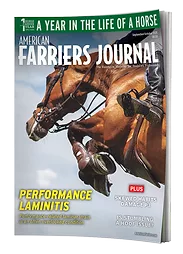The United States House Appropriations Committee on Thursday, July 9, 2020, will consider doubling funding to combat the soring of show horses.
The Subcommittee on Agriculture Appropriations proposes earmarking $2 million to enforce the Horse Protection Act (HPA) of 1970 during the 2021 fiscal year. The subcommittee sent the bill to the full committee after a July 6 vote. The Appropriations Committee will consider the bill at 10 a.m. EDT on Thursday in the Longworth House Office Building in Washington, D.C.
“We applaud Reps. Sanford Bishop and Jeff Fortenberry for their leadership of the subcommittee and for providing additional funding to enforce the 1970 law that made it a crime to intentionally sore the feet of horses at Tennessee Walking Horse shows,” says Marty Irby, executive director at Animal Wellness Action and a past president of the Tennessee Walking Horse Breeders’ & Exhibitors’ Association.
Soring is the intentional application of substances or devices to horses’ limbs to inflict pain in order to achieve an exaggerated high-stepping gait among some Tennessee Walking Horses in the show ring.
The reallocation of the money comes 44 years after Congress effectively defunded Tennessee Walking Horse show inspections. The result led to the self-policing of inspections by the Tennessee Walking Horse industry. Both houses of Congress have since attempted to change the self-policing policy in the form of the Prevent All Soring Tactics (PAST) Act. The House approved the PAST Act in 2019. It remains in the Committee on Commerce, Science and Transportation. The Senate must approve the bill and the president sign it before it becomes law.
Specifically, the PAST Act aims to substantially revamp the farriery of Tennessee Walking Horses, Spotted Saddle Horses and racking horses. They would prohibit the use of action devices, “weighted toe, pads, wedge, hoof band, or other device or material at a horse show, horse exhibition, or horse sale or auction that is placed on, inserted in, or attached to any limb of Tennessee Walking Horses, racking horses, Spotted Saddle Horses … to artificially alter the gait of such a horse; and is not strictly protective or therapeutic in nature.”
The legislation defines action device as “any boot, collar, chain, roller, or other devices that encircles or is placed upon the lower extremity of the leg of a horse in such a manner that it can rotate around the leg or slide up and down the leg, so as to cause friction; or strike the hoof, coronet band, fetlock joint, or pastern of the horse.” The legislation does not consider soft rubber or soft leather bell boots or quarter boots that are used to protect the foot as an action device.
Opponents of the bill believe that is too heavy-handed and would result in the demise of the Tennessee Walking Horse industry.
“The more logical approach is seen in the House bill introduced by Congressman Scott DesJarlais, which calls for scientific objective testing of all entries and strong penalties for those in violation, as opposed to punishing the super majority of horses and owners that are proven to be doing things in the right fashion,” says Mike Inman, chief executive officer of the Tennessee Walking Horse National Celebration.
DesJarlais’ bill — H.R. 1157 – calls for science-based protocols, including swabbing or blood testing, that have been tested and capable of producing scientifically reliable and reproducible results, subjected to peer review and accepted in the veterinary or “other applicable scientific community.”







